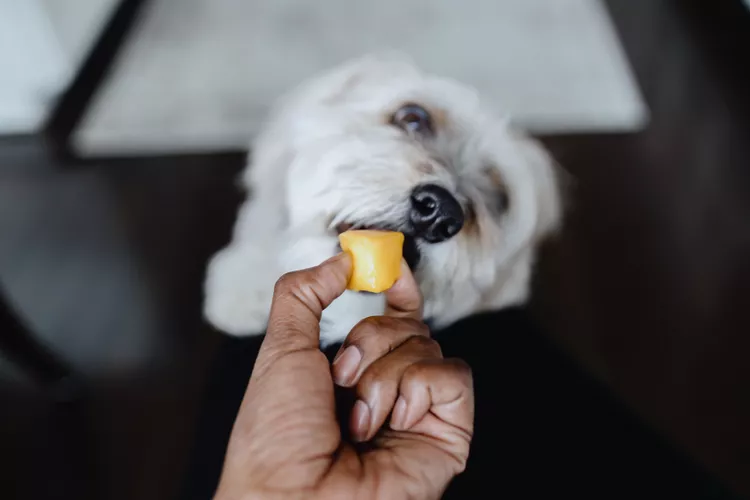
Can dogs eat papaya? Yes, dogs can eat papaya in moderation, and it may even provide some valuable health benefits. As always, it is important to keep in mind that dogs and humans have different nutritional needs, and they can't eat as much fruit as humans safely can.
Here's everything to know about sharing papaya with your furry best friend.
Papaya is rich in many nutrients that are beneficial for dogs, including:
While papaya is non-toxic and safe for dogs in small amounts, there are some important considerations to keep in mind before feeding it to your pup:
The best way to offer papaya to your pup is to share ripe pieces of the fruit that have been cut into bite-sized pieces. Remove the skin, seeds, and any unripe parts of the fruit that may be difficult to chew and/or swallow. Serve papaya plain without any seasoning, spices, or added ingredients that may be unhealthy or toxic for dogs. As long as you offer it in small, occasional treats, papaya can be a good addition to your dog’s diet.
Many fruits are safe and healthy for dogs to try, as long as they are always offered in moderation. Be sure to avoid fruits that are unhealthy and/or toxic to dogs including grapes, raisins, avocados, and citrus. Be aware that for many fruits, the flesh of the fruit itself may be safe but the plant and seeds may be toxic. Some of the fruits that are safe to share with your pup include:

Everything You Need to Know About Raising Your First Cat
Whether you are thinking about getting a cat or just adopted your first one, these are the things to know to make your relationship a lasting one.
8 Ways To Help Your Cat Lose Weight
Cats who are at a healthy weight are happier, more agile, and tend to live longer. Here are 8 tips for managing a cat weight loss programme
Heart Disease in Cats
Like humans, cats can get heart diseases that may lead to serious problems. Learn all about symptoms along with the causes, treatment, and prevention.
Is Coconut Oil Safe for Cats?
Coconut oil is touted as a miracle food. Can coconut oil improve your cat's health? Is coconut oil even safe for cats?
Taurine for Cats
Taurine is an essential animal protein in your cat's diet. Learn more about the various ways it supports your feline's body.
Can Cats Eat Peanut Butter?
Peanut butter is not toxic to cats, but it might not be the best choice of treat for them.
Why Do Cats Stare at Walls?
Cats can have some quirky behaviors, including staring at walls. Why do cats do this and when should you be concerned?
Patellar Luxation in Dogs
If your dog has a knee that seems to pop out of place, it may have a patellar luxation. Find out what this means and what can be done about it.
13 Signs of Cancer in Dogs
The signs of cancer in dogs may include lumps and bumps, lethargy, vomiting, diarrhea, pain, abdominal swelling, and more. Signs may be mild or obvious depending on the type of cancer and its severity. Learn common signs of cancer in dogs so you’ll know when to call the vet.
Ear Mites in Puppies and Dogs
Ear mites can be a big discomfort for puppies and dogs. Learn about the causes, treatment, and prevention to keep mites away from your pets.
Why Do Dogs Eat Dirt?
Some dogs eat some strange things. What does it mean if your dog eats dirt and when should you be concerned?
200 Tortoiseshell Cat Names for Your Bi-Colored Kitty
Tortoiseshell cats are a rare phenomenon and deserve a fitting name. We've pulled together 200 tortoiseshell cat names, including male names, female names, cute names, and names inspired by their coat color and pattern.
How to Manage Your Cat's Claws
Here are ways you can help your cat maintain healthy claws while protecting your furniture at the same time.
Hair Loss in Cats
Hair loss in cats is a common problem with many possible causes. Learn the causes, treatments, and prevention of hair loss in cats, also known as alopecia.
Neurological Disorders in Cats
Neurological disorders in cats range from minor to serious. Any neurological condition is a major disruption to your cat's central nervous system. Learn the causes, treatment, and prevention of neurological disorders in cats.
Hair Loss on Hind Legs in Cats
Cats experience hair loss on their hind legs for a variety of reasons. Learn about potential causes, treatments, and ways to prevent it.
Can Cats Have Milk? Why They Really Shouldn’t Drink The Stuff
Despite what we’ve learned from pop culture, cats shouldn’t drink milk as most cats are lactose intolerant. Learn more about feeding milk to cats and alternatives you can feed your cat instead.
Can Cats Eat Dog Food?
Can cats eat dog food? In small amounts, it's unlikely to be a problem, but long-term feeding of dog food to cats can cause health issues and malnutrition.
Why Some Black Cats Look Different in the Sun
Some black cats look different in the sunlight. Whether it's cat genetics, a mutation, or a summer "rust," learn why they appear to have another coat.
Training Your Fearful Cat to Be Confident
Cats can become scared for any number of reasons. Learn about techniques that can help your fearful cat and reduce its anxiety so kitty lives a happy life.